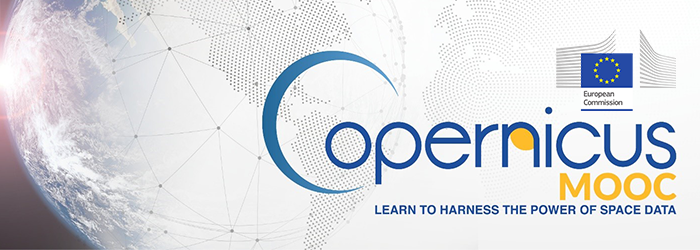
Copernicus MOOC – Your opportunity to learn how to harness the power of space data!
Copernicus MOOC – Your opportunity to learn how to harness the power of space data!
28 February 2020
The Competence Centre – in collaboration with the University of Luxembourg – proudly presents a brand new training project:
The Copernicus MOOC (Massive Open Online Course): a free online training aimed at enabling anyone to address challenges linked to space data.
The increasing availability of massive amounts of space data, particularly from the EU’s Copernicus Programme, provides a wealth of opportunities for organisations large and small, in the private as well as in the public sector, to develop and deliver new and innovative products and services in a variety of areas such as mobility, energy, logistic, pollution control, urban management, land use or agriculture – just to name a few. However, getting started with Copernicus data and services can be challenging, thus the idea of creating a facilitating MOOC was born.
Participants will learn how Copernicus data and services can be used to address societal challenges and generate business opportunities. In particular, they will learn how Copernicus – and space data in general – can be used to support evidence-based public policy, as well as to develop new products and services, open up new markets, improve quality of life, and make the most of limited resources in a sustainable way.
The MOOC aims to make Copernicus and its ecosystem accessible to all. It is designed for all people who use or could benefit from using geo-information data, but who have no or limited prior experience in doing so. All first-time and intermediate users of Copernicus data and services from the public and private sector and public sector are therefore invited to participate: civil servants, policy makers, entrepreneurs, innovators, intrapreneurs, service designers, etc.
The course will address three key topics:
- Understanding Copernicus data and services– what they are, and how they can be accessed and used
- Learning from success stories– understanding how existing Copernicus-enabled services and applications have been developed and deployed
- Doing it yourself– acquiring the key skills and knowledge to develop and deploy Copernicus-enabled products and services and to navigate the Copernicus ecosystem.
The course modules will be taught in English by internationally-recognised experts such as Tonie Van Dam (Full professor and Chief scientist in Physical Geodesy at the University of Luxembourg) as well as successful practitioners. Various engaging and interactive formats will be used during the lessons, from webinars and videos to use cases and projects. The course is built on a user-driven approach aimed at enabling participants to work on their own projects, learn from others, understand the latest trends in situational awareness technologies, and become active members of the Copernicus community.
The MOOC will involve practice exercises and a final assessment. Registered participants will receive a certificate upon successful completion of the course.
The Copernicus MOOC will be held twice in 2020:
- MOOC 1: March – May 2020
- MOOC 2: September – December 2020
Each MOOC will consist of 12 lessons of 2 hours each, over a period of 12 weeks.
MOOC 1 will start on Monday 09 March 2020.
Don’t forget to register! https://mooc.copernicus.eu/
Share this article on :

